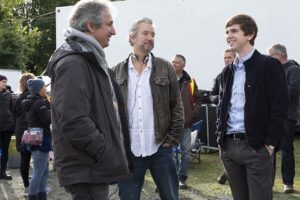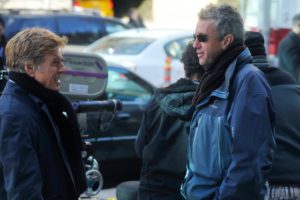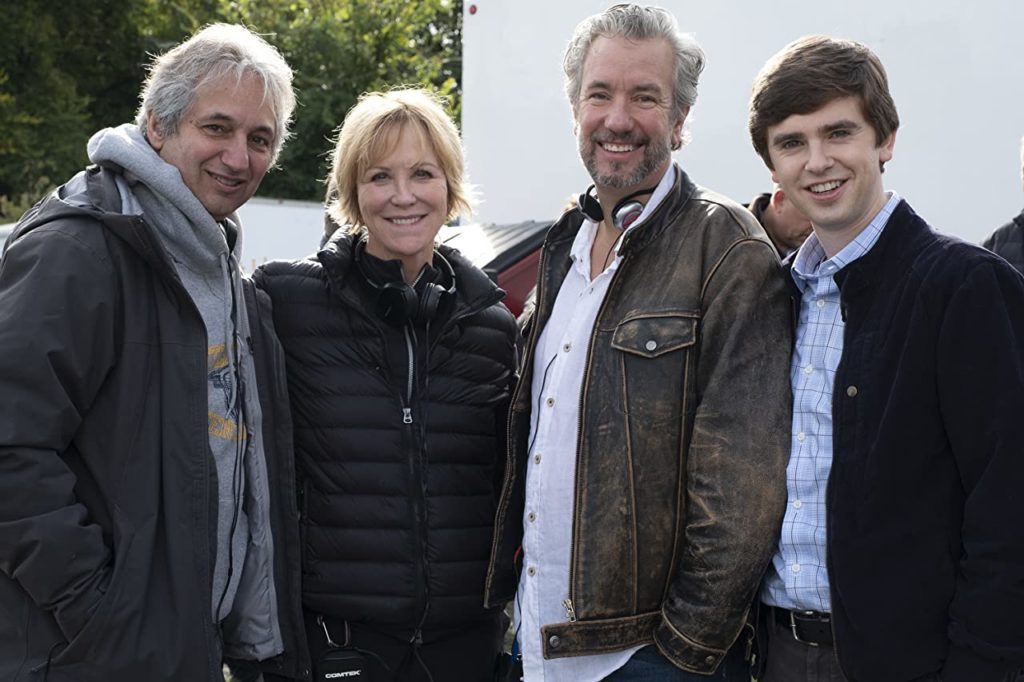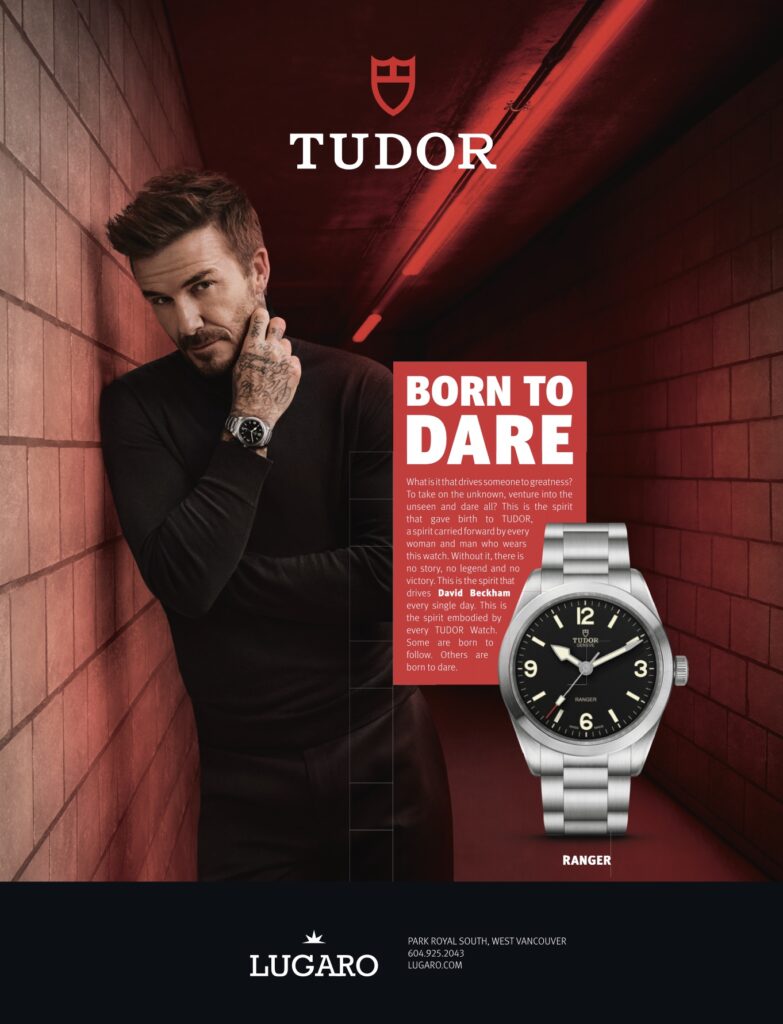Welcome everybody back to another episode of WestVancouver.com / West Vancouver Magazine Podcast. Here in Hollywood North, we have lots of glam. And live on air with me today is one of those people who makes it all happen. We have Shawn Williamson here with us from Brightlight Pictures. It doesn’t get any better than this when it comes to lights, camera – action! Shawn, thank you for joining us.
Shawn
Oh, thank you, my pleasure.
Cat
Now I can only imagine what you’ve seen over 20 years of movie-making, T.V. and films. You’ve been involved in all aspects of it. Rumour also has it you’re from North Vancouver. So, where did this all start?
Shawn
Well, I did. I grew up in North Van. I went to Argyle. And so I’m a North Shore boy originally. But it started organically out of the theatre. I went to university for a very brief moment, and discovered it wasn’t really for me, and ended up working at the Arts Club Theatre where I did an apprenticeship and ultimately worked in all kinds of different technical and behind the scenes positions over the years – and ended up there as a stage manager before I transitioned into film and television.
Cat
So you weren’t the guy up front doing the tap-dancing – you were always the guy kind of behind the scenes helping put it all together? (laughs) Is that kind of accurate?
Shawn
I’ve never been on stage. (laughs) I have no talent whatsoever. So I’m very, very happy behind the camera.
Cat
Well, that’s completely not true. Because you clearly have absolute mounds of talent to be able to survive in what is an incredibly difficult industry and sometimes made more difficult by the fact that you’re Canadian. I know L.A. is a tough scene as well for anybody looking to make it big, but you’ve clearly made it big. So what exactly would you say your job title is? Tell us, what does somebody in your position do? What is your day like?
(Use the timestamps below to forward ahead in the podcast above)

02:47 – Shawn
Well, it really does vary. Different producers do very different jobs. Some are working in development, finding scripts and packaging them, or putting them together with other talent, with actors, directors and studio money. And some producers, which is how I started, just grew up making movies.
Vancouver has generally been a destination for foreign films. And it certainly now has blossomed and grown and matured into a proper production destination where you can finance and package films. But earlier on, it was a destination. So I grew up in the industry making movies and television shows for U.S. studios or foreign financiers.
And so, part of my job originally was simply to make the movie. And you are effectively the employer on set. You’re the person that deals with the creative elements. You juggle all the elements that you would think – actors, directors, the studio’s desires, and the script. So you have a budget you’re working towards, and you’re spending effectively every part of that budget. But it’s largely people management, and our philosophical view in producing comes from what I learned at the Arts Club as a stage manager.
05:36 – Cat
Wow, well, I’m going to guess that there isn’t a producer’s school – this is something you had to really get in and get your hands on, as you said, use your experience. But it sounds like you really need to hone your focus and your talents on keeping all these balls in the air. I imagine the bigger the story, the bigger the script, and the bigger the cast, the more it can really run wildly out of control. So that sounds like that’s the hardest part – but what is the best part of your job?
06:18 – Shawn
The best part is the people – and telling stories. We’re making television, we’re telling stories, we’re making films and such – it doesn’t really matter when you compare what we do to firefighters, and teachers and nurses and people that actually make a difference. When you can find people that have that in perspective, you really recognize how blessed and how lucky we are to do this for a living and make money. But basically, we’re telling stories – and I was so fortunate and blessed to have found sort of my path early. So the best part of my job generally is the people you’re working with.
07:15 – Cat
You still have that enthusiasm and the genuineness in your voice and a love of people. And speaking of people, I’m going to rattle off some names here and embarrass you a little bit. So speaking of 20 years, I’m going to guess that that’s approximately how long ago I met you. I’m dating both of us here because you were producing three films back then. And it was a big moment – because I walked in, and there was Michael Keaton (he was involved in the first White Noise movie that you did here). Then there was Martin Short (doing the Jiminy Glick movie). And over to my right was the very handsome Chris Klein (he was doing Long Weekend). These are the big names that you started with – but the list goes on. You’ve got so much in the portfolio – Nicolas Cage in The Wicker Man, Al Pacino in 88 Minutes, Anne Hathaway, Halle Berry. Then there’s the studios – Netflix, NBC, Prime Video, Disney, Nickelodeon. And your main project right now is with ABC and The Good Doctor, which you are co-producing with the star of the show Freddie Highmore. Give us some of your memorable moments over the years – and start us off right back with the movie White Noise and the Michael Keaton moment. I believe that was a big part of the history of Brightlight.
09:36 – Shawn
White Noise was accidentally the largest film that we own that we produced early on. It was a smaller $10 million project that we put together with a company called Gold Circle out of L.A. and the U.K., so it was done as a British/Canadian co-production. It was something that we developed with a guy named Paul Brooks (of Gold Circle) and managed to sort of put together. We had a great script, we had a great director, we had a great cast, of course, with Michael [Keaton] and others. And we made the movie. Then Universal came in, watched the film in the edit room – and bought it out of the editing room, which was awesome. But it was really because of the script. It was well executed. We made a good movie with great talent. And it went on to make a lot of money.
As a small or medium-sized Canadian movie, it was awesome because it put us on the map in Hollywood. And Hollywood is run really by two things – the studios, and the talent agents (the people that control the actors and the writers and directors). And getting them on the phone can be very challenging. And after you’ve made a movie that you actually produce, and you actually own – that was something that we developed. Hollywood can see that, and they take you differently, and they see you as what they consider to be a producer. So that’s why that film helped.
So then, I had done an interview (just as that movie was opening), and it became accidentally front-page news, with a bit of misinformation, that suggested that we were moving our company to Ontario. And that was not exactly accurate. It created a great stir here because we suddenly had the number one movie in the theatres in North America, and we’re leaving British Columbia! And I said, ‘that’s not exactly right’. So it got the attention of the provincial government – and I think it was Gordon Campbell, who was premier at the time, called me. And I actually [explained] that we were budgeting another territory, which we do all the time. We’ve shot movies all around the world. And we will always go where we need to, to make a movie. But I have no desire to leave British Columbia. We love it here.
12:36 – Cat
Well, British Columbia loves having you here. What kind of projects do you like taking on?
13:14 – Shawn
I don’t know that we have a genre or a specific style for us. It comes down to finding good stories. So we’re shooting a new movie right now called Float, which is spectacular. And the script is amazing. And it’s a great director out of Toronto who’s an up-and-coming talent. So for us, it’s finding these things.
One of the nice things about The Good Doctor, isn’t just that Freddie Highmore is an amazing talent, but the scripts that come up are spectacular. They’re very well-timed. So when COVID was happening, for the first few episodes last year, the writers made an active choice to not ignore COVID but not to bleed into it. And midway through the season air (and this was season four last year), we started to see that people are enjoying this because it took you out of it. You aren’t living in a COVID world, and you aren’t seeing people with masks in the background. You weren’t having doctors having to address COVID every episode. It just became a nice, warm show with warm human stories.
And so, going back to your question about which projects we love – there are episodes where you go, oh God, I’ll cry. There’s one version next week where you cry just reading the script. It’s so warm, so touching. And that’s what this is all about. How can you draw emotion out of what we’re shooting and convey that to the audience in a way that it actually touches them. And that’s what’s awesome about what we do for a living.
15:29 – Cat
I want to mention this because I don’t know if anyone knows the little trivia moment. At the beginning of COVID, when the masks and the PPE were all in very short supply – there’s a little rumour running around that the set of The Good Doctor actually donated some of the gear which you use on set, which is real PPE masks. But you contributed and helped out where you could by giving [gear] to some of the frontline workers. True or not true?
16:12 – Shawn
True! We scoured our sets and our props department and war department, and anything that was real that they could use we sent to Vancouver Coastal Health.
16:23 – Cat
So with Brightlight Pictures, when you bring people to Vancouver, and you connect with people in Vancouver, Brightlight is part of that huge connection. People really like being here in Vancouver, don’t they?
16:51 – Shawn
Oh, yeah. If your people are coming to Vancouver (and especially if they live in L.A.), it’s generally a very easy commute and easy to move back and forth. It’s a beautiful city. People are friendly. They tend not to mob the celebrities that you might see in the street. People are kind and thoughtful and generally give them all their space. So it’s a nice safe, fun place to be.
17:22 – Cat
So I want to know your opinion on this one – because we have streaming services, and more people talk about ‘cutting the cord’. And again, COVID meant people were banned from going to the theatre and big screens. I get the feeling actors and camera people hate that. Because when you’re making a movie, the ‘big screen’ is as much a player in this as anything. We’ve got lots of innovations in tech. So what’s the biggest change? Over the last 20 years, what have you seen that has had the most effect on this industry?
18:16 – Shawn
Well, two things that have changed in the industry. One is what you just described – the streamers. And the streamers have now become fully monetized. They are effectively all real studios now with Apple, Amazon and Netflix. And during COVID [they] flourished. Because everybody could subscribe to all of these services and watch pretty much what they wanted at home. So how we sell our product will continue to evolve. And the need to sell your film into this theatrical market, to do what we did on White Noise or other movies back in that day, has significantly changed.
How we shoot, and technically what we shoot, is identical, and not much has really changed. Of course, the technology is much different. We’re more efficient, and we have way more technical and creative ability with visual effects and sound design that never existed back then. So our creative canvas is much, much larger now than it was then.
The decline of film as a medium to shoot on [has changed]. Actually, the last time I shot on film was nine years ago, perhaps. And it was Robert Redford who directed a film we did called The Company You Keep – and he was shooting on film. But it’s Robert Redford. (laughs). Quentin Tarantino does it sometimes, and very specific filmmakers continue to shoot on film. But for the most part, 95% to 99% of what is being shot now is shot digitally.

21:01- Cat
Well, we’re all walking around with these phones, but they’re really supercomputers [with] cameras, and what they can do is really impressive. I get pitched almost every week. ‘Oh, you’ve got to see the film my kid made on iMovie.’ All this software and technology has drifted down to the desktop. So the talent is being cultivated much earlier. But that’s the future. So, where are you going to be in the future? Where is Brightlight and Shawn Williamson going to be five years from now?
21:54 – Shawn
Well, the ‘kids’, as we call them, who are producing now. These people will be moving in and stepping into my shoes. A new change will be bringing in these kids who are incredibly talented producers who are working with us now producing some of our projects right now – and I’ll slowly do less and less. I’ll still always be here and keep working. I have no plan to ever retire, but I certainly have a plan to work less and not do quite as many shows as we might – but that’s where the kids can come in, and they can do it.
22:58 – Cat
I hope you go nowhere. Your fan base out there has loved every minute of it, and it’s so exciting to know that you are one of the pioneers in bringing all this spectacular attention to Vancouver for the hard work you do. Congratulations on your anniversary. Twenty years is no easy feat. Thank you to Shawn Williamson and everybody at Brightlight Pictures on your 20th anniversary. And until next time, I hope everybody will stay in touch, and save me a smile.


